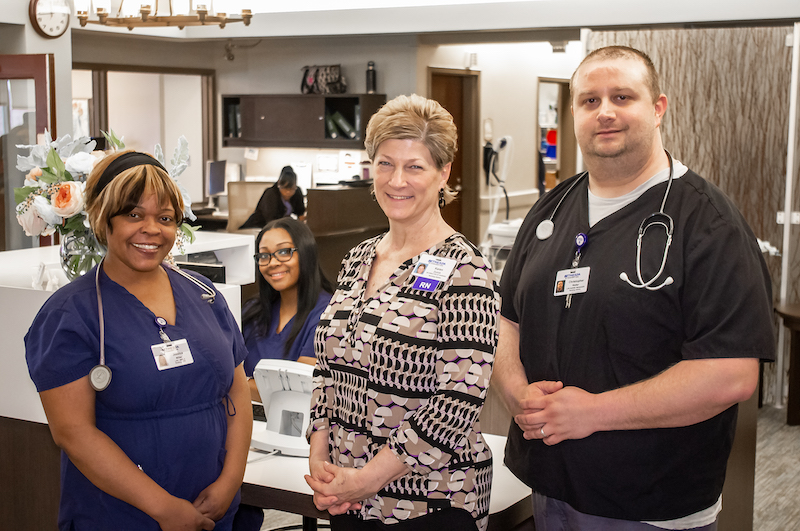Karen Zurick worked in the kitchen of a long-term care community while she was in high school. The experience made quite an impression on her. Even after graduating from nursing school and working as a nurse in various settings for 20 years, she kept thinking about her experience. “I was just drawn to people needing help in their last remaining years,” she says.
For 15 years, Karen has worked for Bethesda, the last three as the Director of Nursing for Barnes-Jewish Extended Care (BJEC), a skilled nursing home community in Clayton, MO, owned by BJC HealthCare and managed by Bethesda. “I got lucky when I came to work for Bethesda,” Karen says.
It was a good fit because Bethesda was in tune with what she believed about delivering care and providing leadership.
Opportunities in Senior Care for Nurses
Because Bethesda has several long-term care communities in the St. Louis area, many opportunities exist to find nursing positions across the area, and transfer if an advancement opportunity becomes available.
In addition, long-term care systems like Bethesda provide a variety of nursing positions or job opportunities that require nursing experience, including floor nurses, home health and hospice nursing positions, staff and nursing educators, nurse managers, coordinators who collect patient data for Medicare reimbursement, and openings for nurses in administrative positions.
“I can think of at least 15 nurses we hired as new graduates who have worked in one of our communities and progressed to become a nurse manager, a supervisor with us, or director of nursing in other medical settings,” Karen says.
Education and Professional Growth
According to Karen, Bethesda’s tuition reimbursement program is a rare offering for long-term care companies. To make working and going to school easier, Karen explains that Bethesda provides flexible schedules.
“We work out a plan for employees,” Karen says. “Maybe they need some weekends off to complete their clinical work as part of their training, or they need to go part time until they can complete their schooling. We want to keep good employees and allow them to grow, so we are highly focused on education and making sure that our nurses have the tools and skills they need to be successful.”
Benefits and Bonuses
“We have a pretty generous Earned Time Off package, as well as a really good referral bonus for current employees who bring someone on board with us,” Karen says.
Benefits also include health and life insurance, short and long-term disability benefits, and extra shift bonuses paid on top of overtime pay for nurses who stay over a shift during a staffing shortage.
Bethesda’s Employee Assistance Plan is available for employees who may have conflicts and challenges beyond their working life. “We believe it’s important for people to know we support them as a whole person,” Karen says. “If you show an employee that you care about them, and believe in them, those are the people that turn into the best employees.”
Rewarding Patient Relationships
One major difference Karen cites between a floor nurse in a hospital and one in a long-term care community is the time the nurse gets to spend with patients and residents.
“In a hospital, a nurse may spend two or three days at most with a patient. In a rehab facility like ours, it’s more like three weeks, and it can be longer if the patient becomes a permanent resident in long-term care,” she says. “We form relationships and strong bonds with the people we care for. We get to know their families. We feel that the better we know the people we are caring for, the better we are at serving them.”
Karen remembers a patient who had fallen and was sent to BJEC for her post-hospital rehabilitation. “She didn’t have any family that lived nearby and couldn’t stay in her home,” she recalls. After rehab, the woman stayed at BJEC but seemed to give up on herself. “She wouldn’t get out of bed; wouldn’t speak to anyone or get dressed. We weren’t sure if she cared whether she lived or not.”
Three years later, the woman gardens at BJEC, delivers drinks to other patients, and walks laps around the facility. “We are home for her,” Karen says. “And it’s because we worked with her and built a relationship.”
The Bethesda Difference
One factor not found in a company brochure when nurses are thinking about their professional future may be the most important consideration of all.
“The senior management at Bethesda are just really good people,” says Karen. “I’ve worked at a lot of places, but none where leadership listens this closely to the people out there doing the work. Their goal is to give us what we need to deliver high-quality service, whether that’s in dining services, housekeeping, employees who transfer patients, or medical staff.”
In keeping with that philosophy, “thrive” is one of Karen’s favorite words, as she sees it as her job to make sure her employees receive the support they need to succeed. “It’s the best part of my job,” she says.
“If you can find that environment as a nurse, that’s where you should go,” Karen says. “I would tell any prospective employee that there are probably 50 places you can work in this area in health care, but I would bet Bethesda invests more in its employees because they believe employees make or break what we are trying to do. So we invest resources in them to make it a great place to work.”
Looking to begin your career in senior care? Browse our open job listings at our communities across the St. Louis area, and get in touch to get started.
| Whether in independent living, assisted living, memory care, or skilled nursing, Bethesda offers the right amenities, services, programming, and staff to make every day full of purpose. See for yourself and tour our independent living communities, including Bethesda Barclay House – Clayton, Bethesda Gardens – Kirkwood, Bethesda Orchard – Webster Groves, Bethesda Terrace – South County, Village North Retirement Community – Florissant, and The Oaks at Bethesda Villas – Kirkwood/Webster. |
Want to find out more?
If you’d like to stay up to date with Bethesda Health Group, sign up here to receive our blog and newsletters!
"*" indicates required fields
Related Articles
Want to find out more?
If you’d like to stay up to date with Bethesda Health Group, sign up here to receive our blog and newsletters!
"*" indicates required fields



